scifi
OUT OF THE SILENT PLANET, A No Spoiler Review
OUT OF THE SILENT PLANET, by CS Lewis came about as a result of a coin toss between JRR Tolkien and CS Lewis in the 1930s. The understanding between the two men; one side of the coin would mean writing a science fiction novel, the other side would mean writing a time travel novel. The coin was tossed, Lewis was assigned the scifi novel. Tolkien was assigned the time travel novel. Tolkien never wrote his. Lewis did, published in 1938, twelve years before Narnia. In fact, he wound up writing three books of science fiction. OUT OF THE SILENT PLANET, which I will review here, was the first. This story is sophisticated, but there is no reason a YA reader or a very learned middle grade reader cannot take on this story. For educators thinking about assigning this book to a young person, a solid discussion on the story would make the experience a profound one.
The Short Review: 4 Reasons to Read OUT OF THE SILENT PLANET
- Superb writing and because this is CS Lewis, when you’re finished reading, your brain will have expanded
- Scintillating ideas that awaken the conscience…Plunge yourself into the mindset of a WWI veteran and a brilliant observer of history and soak in Lewis’ crucial critique of pre-WWII Europe
- Absorb Lewis’ Christian concept of God/Creator…the beauty and the moral implications
- Gain a vision for the power of fiction (imaginative science fiction in particular) as a way to change hearts and minds.
A Few More Details:
When Lewis and his friend and colleague, JRR Tolkien, both veterans of WWI, decided to toss that coin, they had been musing together about the sad state of fiction. They believed that the godless universe theory unleashed to some degree by Darwinists and proponents of the Hegelian superstate/superman, was giving rise to real beliefs (like eugenics which both understood as dangerous and evil) inside academia and government. More troublesome, these theories were making their way into fiction and infecting the broader population through story.
Americans fought in WWII and helped to defeat Hitler, so my nation (I am a US citizen) often forgets how the eugenics movement in the US was accepted and backed by some of our highest state actors, like President Woodrow Wilson. We in the US forget, maybe conveniently so, that we too were traveling on a similar road as the Nazis. This is how pervasive these ideas were and back in that day, they were considered progressive. It turns out, anything can be labeled progressive. A cautionary and hopefully humbling reminder to us in the 21st century.
Marxist ideology was also suspect in Lewis’ eyes. Both Marxism and Fascism preached an exercising of power where the end justifies the means. That idea was an abomination to Lewis and Tolkien, the rejection of which made its ways into the Lord of Rings trilogy, as it did into all of Lewis’ writings. As Christians (Lewis, an Anglican, Tolkien, a Catholic), they challenged the idea that the state has permission to sacrifice an individual for some greater good, not without that individual willingly giving up her/his life, soldiers willing to fight to defeat the existential enemy of a free state being one example of this proper sacrifice, something both of these men witnessed first hand.
In regard to reading OUT OF THE SILENT PLANET, knowing a little 20th century history and philosophy definitely helps the reader enter into the world of Elwin Ransom, the hero of the story, but even without that knowledge, this is a fascinating and well written tale. Ransom, a philologist, is on a walking tour of rural England. He is kidnapped and taken to Malacandra (the planet Mars). What unfolds is a story about relationship and curiosity (Ransom’s journey) versus dominance exercised by violence (the journey of his kidnappers). The narrative provides a resolution that exemplifies the idea that there is a standard of justice that is literally universal.
This is my third time reading OUT OF THE SILENT PLANET (notice my beat-up copy in the image above…not sure it will survive another read-through) and after finishing the book this round, I found myself dreaming about grace and kindness and goodness while I slept…something that doesn’t often happen for me after reading science fiction before bed.
12 MONKEYS A No-Spoiler Review
My son is visiting Wisconsin and after work, we are alternatingly choosing films to watch together. Two nights ago, we watched a horror flick he chose called Hereditary, which was decent, not awesome, but was made by the same film company that produced Ex Machina(which I loved and realizing now, I have never reviewed this flick on my site…must amend).
Last night, we watched 12 MONKEYS on Amazon Prime for $3.99. This film would probably be rated PG-13 today. No sexual content really, just creepy apocalyptic tension. And wow! This is still an awesome film and has aged well. Today, I asked my GenZ kid…What do you think? Would most GenZers like this film?
He said.
Absolutely. Yes.
It’s been a while since I’ve watched 12 MONKEYS, but given my vague memory of it, I thought…might be worth the time.
One pleasure, as an older film fan, was to remember Bruce Willis and Brad Pitt remarkably in the same film. Not sure it happened in any other, but what Terry Gilliam delivered on the screen between these two, was close to perfection. This is possibly Brad Pitt’s finest acting and if you’re a fan, you’re gonna have to watch. A few images below underlie my point.
First, my Short Review: 4 Reasons You Want to Watch 12 MONKEYS
- Weird and dystopian tale, echoing Blade Runner in tone and style.
- One of Terry Gilliam’s masterpieces
- Possibly Brad Pitt’s finest acting
- Bruce Willis playing his iconic gritty and misunderstood character
- Great storytelling
Just cannot get enough of these scenes, shots of these two iconic men, culture-impacting actors for the last 30 years.
And
The Longer Review
Sometimes when you re-watch a film like 12 MONKEYS, you wonder how it’s gonna age. As an older person, you think (because you have experienced this before), was I impressed because of something slightly superficial and trite, or was this film truly great? With this flick, you need not worry. 12 MONKEYS delivers on so many levels. First, it delivers on weirdness of setting, including its gritty urban reality. My son (25yo), who has watched Blade Runner understood the dystopian aesthetic of this world. He even commented on the similarity. That, in and of itself, makes me feel I am doing my job training up my children. Second, 12 MONKEYS delivers on story. There is a clear protagonist, a vaguely enormous villain (that proves to be more personal in the final scenes) and enough mystery to keep the audience in tension. Finally, there is weirdness and surprise and the best aspects of science fiction where the perspective being put forward from one or two of the characters absolutely blows up the assumptions and values of the audience. And, if nothing else, respect these images…bizarre and gorgeous. Terry Gilliam is a genius.
FOR ALL MANKIND, A No Spoiler Review
Apple Plus released its third season of FOR ALL MANKIND this month. I have not viewed any of the 3rd season but I did watch all of 1 and 2 and loved them. What follows will be the short review and a longer review of season 1 and 2. If you’re convinced by the short review…start watching now. If you need a little more data, the longer review will give you a better idea of why this many hours of consumption might be worth your time. The show is rated R for a few racy sex scenes, but if your young person can handle that, the education piece is interesting. A bit of history can be etched out or explained as some of the “alternative” version comes across the screen. It’s portrayal of communist USSR rings true. It also captures something of the spirit of the age for each decade, especially the urgency around the space race of the 1960s.
The Short Review: 6 Reasons I Recommend FOR ALL MANKIND
- If you love alternative history narratives like The Man in the High Castle, you will appreciate this story
- If you love nostalgia settings and music, think Stranger Things, you will love being immersed in this story-world, which starts in the 1960s, but spans decades.
- Most of us appreciate great casting. FOR ALL MANKIND will not disappoint
- Top-notch production value, this includes the writing, the special effects and the acting
- Good pacing. A lot of action, drama and tension throughout
- A thoughtful story. A sprinkling of social commentary for our current time…some of that commentary I liked, some I felt was contrived, but the ideas are worthy of our attention
The Longer Review: (this review contains a couple of small spoilers)
The USSR and the US are in a space race in this alternative history, set during the cold war. The USSR has landed on the moon first, claimed it as territory, and has aims to build a military compound. This traumatizes the US as a nation. The first episode captures the feeling well as it feels like a gut-punch watching the Soviet flag raised on the moon and hearing the first words of the Russian Cosmonaut as he takes the first steps…The Walter Cronkite figure on the television news reports as follows:
The first man to set foot on the moon spoke just moments ago. “I take this step for my country, for my people, and for the Marxist-Leninist way of life. Knowing that today is but one small step on a journey that someday will take us all to the stars.”
FOR ALL MANKIND was created by Ronald D. Moore (Battlestar Galactica, Star Trek and Outlander), Matt Wolpert and Ben Nedivi. They take the “what if Russia had landed on the moon before we did” scenario and create a similar history to our own, but with differences that intrigue. The writers, I surmise, are progressive in their leanings because progressive values make their way into the script and into a historically white male dominated NASA long before reality. Sometimes, it feels heavy-handed, like the writers are checking the boxes of gender and racial diversity. However, the results do make for a delightfully diverse cast.
In episode 1, the audience meets Margo Madison (pictured above, played by Wrenn Schmidt) at the beginning point of her NASA career where she is the only woman in the male dominated control center. By season 2, she emerges as NASA’s head.
By the finale of season 2, women, a couple of non-binary individuals (though they keep their gender preferences a secret), African Americans and even a Mexican female immigrant who came over the border illegally as a child, are recruited by the NASA of FOR ALL MANKIND. And who can say it might not have been this way had the US felt the pressure of its failure to land first on the moon? Also, the Soviets promote the first female astronaut, shaming the US for its lack of representation.
All the characters are well-drawn and most are courageous and longsuffering in various ways. Joel Kinnaman (The Killing, Hanna and Altered Carbon) plays Ed Baldwin, an astronaut with a big mouth who in a drunken state reveals to a reporter how NASA lost the space race because of an aversion to risk. He is punished for the reveal (taken off astronaut duty and given a desk job), but his words capture NASA’s very real dilemma. In order to stay equal to, or to get ahead of the USSR, risks will have to be taken. Many characters of significance will lose their lives to achieve the elusive prize of space dominance.
This is where the series gives commentary on current society as it poses the questions that plague our century…Who will dominate the future? US and free societies (in general) have dominated the global order since WWII, but that prize came at a great cost to many of our ancestors. We have inherited something hard fought, but that inheritance is being challenged and chipped away by those who see themselves as more deserving of dominance…and perhaps they are, but some moments in history, even national failures, have the capacity to motivate a new generation of warriors. That message shines through in FOR ALL MANKIND.
SEVERANCE, A No Spoiler Review
6 Reasons You Want to Watch Severance
- Two unique settings within a contained, small-story universe. (I will write more about this in the longer review)
- Amazing cast. Adam Scott as the stoic lead, Mark, with a supporting cast that includes Patricia Arquette, John Turturro and Christopher Walken
- Superb characterization and story-telling. The main character and all of the secondaries are complex, layered and quirky, adding to the slow-building tension
- The underlying moral and symbolic truths within the story are not yet fully baked but seem promising.
- This show has a slow ramp-up to gripping tension at the climax of this first season
- More to watch in the future because this past month, Apple approved a second season.
The Longer Review
SEVERANCE is an Apple+ production, the first season is complete, streamable now and free for subscribers.
Created by Dan Erickson and directed by Ben Stiller, SEVERANCE is not a comedy. It falls into dystopian mystery with a scifi vibe. A futuristic technology at the center of the story, allows those who work at a company called Lumon Industries, to surgically divide their memories between their work and personal lives. Those individuals are called The Severed. Most of the other tech is familiar and not so modern, for example, people still drive cars around the town.
I give this series a PG rating…it’s possible it will warrant a different rating later on, but so far the mystery is more Hitchcock than Ridley Scott. My ratings usually reflect the graphic nature of the show and not the themes which in this case are harrowing for my adult brain. Would kids enjoy the show? Probably not. You won’t see explicit gore, but you will feel tortured for these characters at the center of the story, in part because of their vulnerability, which is childlike. The value in watching it with your teen would be to discuss the ethics that emerge around the tech that is at the heart of the story.
Regarding the setting. There are two primary “worlds” in SEVERANCE that exemplify the two worlds inhabited by the employees of Lumon.
One setting is work, the Lumon Industries office building. It feels familiar upon entering, but creepily weird the deeper in you go. The interior design is sterile, with strangely vacant work spaces and long labyrinth-like hallways. The four employees the audience follows most closely work in a large white room with no windows or access to the outside world. They are forbidden to interact with employees from other areas of the building and spend their days huddled around computers doing a job that the audience sees, but doesn’t really understand. In fact, even these employees don’t fully understand what they do, how they do it and why. It’s described as something they feel. Their work is just one of many aspects of this situation that give rise to a suspicion about Lumon. Most of the workers, including Mark (Adam Scott) submit to the rules of the company. There are a few exceptions and those exceptions give rise to Mark’s suspicion about Lumon.
The second world is Mark’s town. This is a cold, dreary place. It feels like it could be Alaska or Canada and is probably unfamiliar to most of the audience. The cold and the dark and size of the town adds to the feeling of claustrophobia, something that permeates this story. Darkness also dovetails with the theme of grief. In episode 1, the audience learns that Mark’s reason for severing came about because of the death of his wife. Mark lives in a housing complex owned by Lumon where it becomes clear, he is monitored unbeknownst to him.
My recommendation to watch SEVERANCE comes with the caveat that I’m still not sure where the story is going. I have viewed the first season and loved every episode. Not everyone enjoys a slow build to a gripping climax, but I do when it’s done well and SEVERANCE does it well. So, if you’re tempted to stop after episode 1 or 2, don’t. The tension ratchets up and up and mysteries become creepier as the conspiracy is partially unveiled.
In my next post, I hope to discuss summer reading which will include:
THE BATMAN, God and Justice. Warning: So Many Spoilers
Last night I had the privilege of watching Matt Reeve’s THE BATMAN. I enjoyed the film, though it was tough to watch, a tense experience. Graphic violence is implied more than shown, but evil and darkness are palpable in every scene. Not that the film isn’t a beautifully crafted story…the dingy special effects are stylized to evoke the brokenness of Gotham. They reveal a failing society in every frame. It’s pouring rain and night during most of THE BATMAN, and of those scenes shot in the day, the skies are gray.
Of course, this is a familiar setting for our comic book hero, the Dark Knight, but what is less familiar is the tone of utter hopelessness associated with that darkness. Violence plagues the city of Bruce Wayne. In the opening sequence, it is Halloween night and masked hoodlums run wild across Gotham causing mayhem, and at one point a gang of them threaten an Asian American man in a subway station, hitting too close to home for many of us. Halloween is also the night the Riddler commits his first murder.
The brutality of humanity is on display in THE BATMAN, begging the question: When is a society so corrupt, so evil, so far gone, there is no hope of renewal and it must be destroyed? This film earned a PG-13 rating. It’s possible a mature teen could watch this and grapple with the question posed above. It’s a hard question, but one that ought to be pondered by all of us.
The rivalry between Batman and the Riddler draws out themes of righteousness versus justice. In certain respects, both men are the same. Both are trying to root out corruption, Both are straining toward a just society. Batman roots out injustice by defending the good guys and working within the system. Though outside the formal police force, his link to Lt. Gordon cannot be denied, nor can anyone doubt his insider status as Bruce Wayne, the orphaned son of a beloved city father. The Riddler however, also an orphan, stands on the outside. He roots out evil by exposing it, by punishing via execution and making a public example of those who have betrayed justice. The Riddler’s first murder is the mayor of the city and subsequently other politicians and law enforcement, those caretakers of Gotham who have made their beds with the mob. Because of these assassinations and the attention he draws to corruption, Batman along with the audience are forced to focus on what is a massively broken system at the highest levels of the city.
The audience wonders whether ANY politicians or police are clean in Gotham, and can such evil be undone when the gatekeepers of justice have become those who perpetrate injustice? The Riddler sees no way out but total destruction.
On the narrative journey, Batman faces truths about his own father. The idealism with which he has viewed his parentage is shattered, evoking for me the psalmist’s words from Psalm 14, text lifted by the Apostle Paul and placed in his letter to the Romans.
The fool says in his heart, “There is no God.”
They are corrupt, they do abominable deeds;
there is none who does good.
2 The Lord looks down from heaven on the children of man,
to see if there are any who understand,
who seek after God.
3 They have all turned aside; together they have become corrupt;
there is none who does good,
not even one.
Why do I include this? In the film, I think Reeves is trying to make a theological point. I bend toward theological rather than philosophical because the powerful reality (loaded imagery) at the end of the film is a flood…as in Noah and the Biblical account of the destruction of evil.
In THE BATMAN, the Riddler has set up bombs that line the seawall on Gotham’s perimeter. The Riddler has determined that Gotham is irredeemable. Gotham must die, drown and be cleansed of its evil. Only then will it be reborn. A flood to destroy evil? This is as old a tale as humanity, understood within Judaism, Islam and Christianity. There comes a time when a civilization is so broken, every living thing has to be destroyed in order for evil to be rooted out. The Riddler sets himself up as God and judge. He determines that Gotham is a total loss. Total destruction is the ONLY remedy for its evil.
Batman represents another side of this argument. Don’t miss the fact that Selina (the Catwoman character wonderfully portrayed by Zöe Kravitz), tries to coax Batman to remove himself permanently from Gotham. I can’t recall her final words to Batman precisely, but they were something like…staying here and trying to save Gotham will kill you.
That comment is an homage to a redemptive sacrifice and Batman as Christ figure…sort of…The audience already knows how much life has been sapped out of the young Bruce Wayne because of his mission to avenge his father, but also to help Gotham. Batman’s motives are often mixed here. Interestingly, this Batman, the Reeves’ Batman grows. He realizes that vengeance is not the full story of how he must respond to evil. To truly honor his dead father and mother, he must do more. He must minister good to the people of Gotham. Two images of Batman in the final scenes make my point. One is him diving into the abyss, lighting his flare and leading innocent people by hand, out of the flood, out of judgment. The other is him helping a wounded girl on a stretcher and holding her hand as she seeks his assurance and is flown away to safety, to healing. Reeves connects the hero, the savior, to humanity with that touch. Redemption in this case is a touch that is gentle and personal, the opposite of violence. Batmas has crossed over from vengeance to love.
The Russia Ukrainian War is raging as I write. Yesterday, Russian planes targeted a shelter in Mariupol, a place holding hundreds of children and women. On the ground on either side of this structure, the Ukrainians had written in Russian the words “children” in very large script, large enough to see from the air. How does one grapple with the bombing of this place, with the destruction of so many innocents? (The number of dead is still undetermined…I will correct this when the fog of war has dissipated.)
Update: on March 25, it was believe that 300 had died in the bombing. In early May, after a thorough AP investigation, it was revealed that 600 likely died in Mariupol theater airstrike.
So, I end with this image, Jesus of Sinai, Pantocrator, an icon from the the 6th century. For Christians of the 6th century, most of whom were illiterate, icons like this were essential to their faith because embedded within each icon are theological truths. For them, looking at an icon was like reading a holy text. With Jesus of Sinai, notice the weird lighting on his face, one side darker and one side lighter. That is intentional. Why? The post-modern viewer might not discern what his face represents but to early Christians, they represent two sides of the creator as God looks out over humanity. If you put up your hand and cover one side of the Messiah’s face, you see a bright and compassionate mouth and eye. When you cover the other side, you see a darker eye, an angry glare. The iconographer and the theologians of that time understood that both are sides of God and both are legitimate responses to evil. The story as laid out in the Bible is of God grappling daily with a society gone wrong. On one hand, he is merciful and forgiving, on the other, he is vengeful and ready to punish, to eradicate evil.
Current people of faith, people like me, struggle with that darker view of God, but we might do well to ponder it. Noah and the flood tell the story of God as do Jesus and the cross. And here we see the author of the new Batman film exploring both reactions to evil, but favoring mercy in the end.
We live in a complicated world, but some truths/questions find their way into our art, even if that art is embodied by a comic book character.
Kudos to Reeves for attempting something really big in his portrayal of THE BATMAN.
THE SILENT SEA, More Brilliance From the Korean Film Industry, A No-Spoiler Review of the Netflix Miniseries
First, the Short Review
6 Reasons I Recommend THE SILENT SEA
- Beautiful production overall, including visuals that underlie the creepy vibe
- Featured a number of my favorite Korean actors, a few you might recognize if Squid Game was on your watch list this past year
- Plenty tension and surprises/frights
- A number of science fiction and haunted house tropes embedded in the story and various characters (see more in longer review)
- The relationships and particularly, the relationship to authority feel authentically Korean. (also, see longer review)
- You know I love the miniseries genre, 1-hour installments of great storytelling that comes to a conclusion without an agonizing cliffhanger
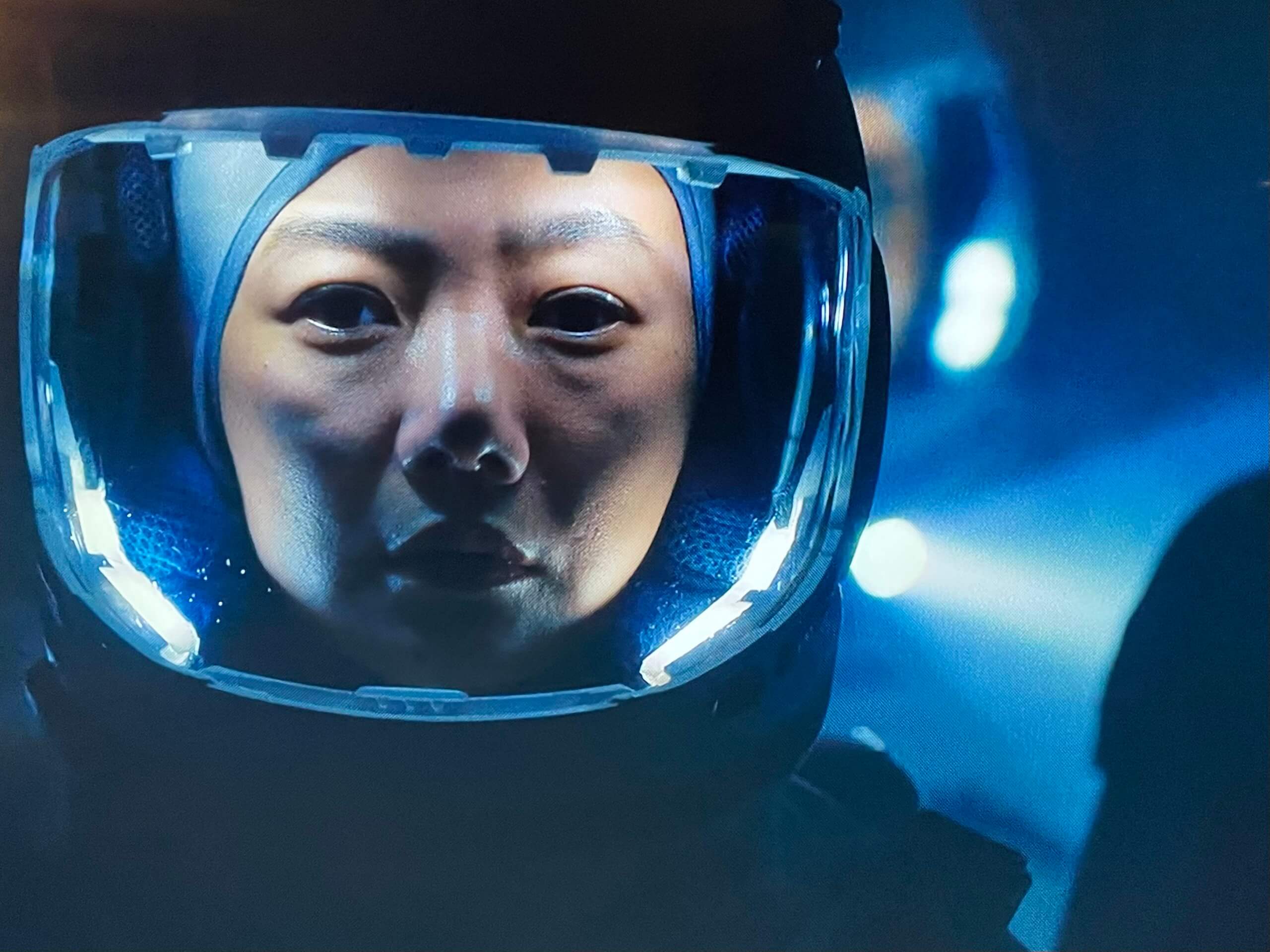
Longer Review
SILENT SEA is the story about a mission to the moon to find water. I rate this series PG-13. No sexual content in this production, but there are dead bodies, and some gore. Family-friendly if your teens are mature. It’s a fun, suspenseful ride.
The first episode quickly gives the viewer the high stakes for this mission. Drought has plagued the Earth. Water is the resource most valuable and due to its scarcity, the planet has become a wasteland. Water is rationed to such a degree, many have suffered physically, billions have died. The wealthy nations have gone into space to find a water source. Most abandoned the idea of finding water on the moon after searching, but the South Korean government kept snooping. There has been a top-secret program at a large moon station that was believed to have borne fruit, but suddenly…the experiment falters. Everyone dies all at once on the moon station. The earthbound directors, including Heo Sung-tae (pictured near end of review) initiate another mission to go to the station and investigate the truth, but secrets pulse underneath the surface of this mission and become one aspect of tension in the story. The authorities hold their cards close and the military and science leaders do not push back, though they suspect something fishy. This may or may not be an aspect of Korean-specific deference to authority, but the screenwriter exploits what I understand as deference in a way that serves the story. Also, this is where the nuanced acting plays such a powerful role in the unfolding of the narrative. The audience can see in the face of Bae Doona, the slight suggestion of twitch, a blink, a stern jaw…we see it, but barely and it helps us know that she understands that she is being deceived. Yet, in most of the outward behavior, she acts the true soldier. Doona is great at this nuanced acting, but she’s just one, among a number of these performers, who pull off such nuance. In my mind, THE SILENT SEA showcases superb writing and better acting than Squid Game. Click for a review of Squid Game

Once the mission lands on the moon, what unfolds reminded me of Ridley Scott’s Alien, in all the best ways. Yes, there will be corpses, tunnels, darkness, betrayals, a terrible and contagious sickness, but there will be one character who keeps her eyes on the prize. Dr. Song (Bae Doona) is intent on discovering the truth. In part, she seeks the truth because her sister is one of the corpses and the holder of many of the secrets. Doona as Dr. Song, pictured above, is a female lead in the Korean zombie series, Kingdom. To see my review of Kingdom, click here
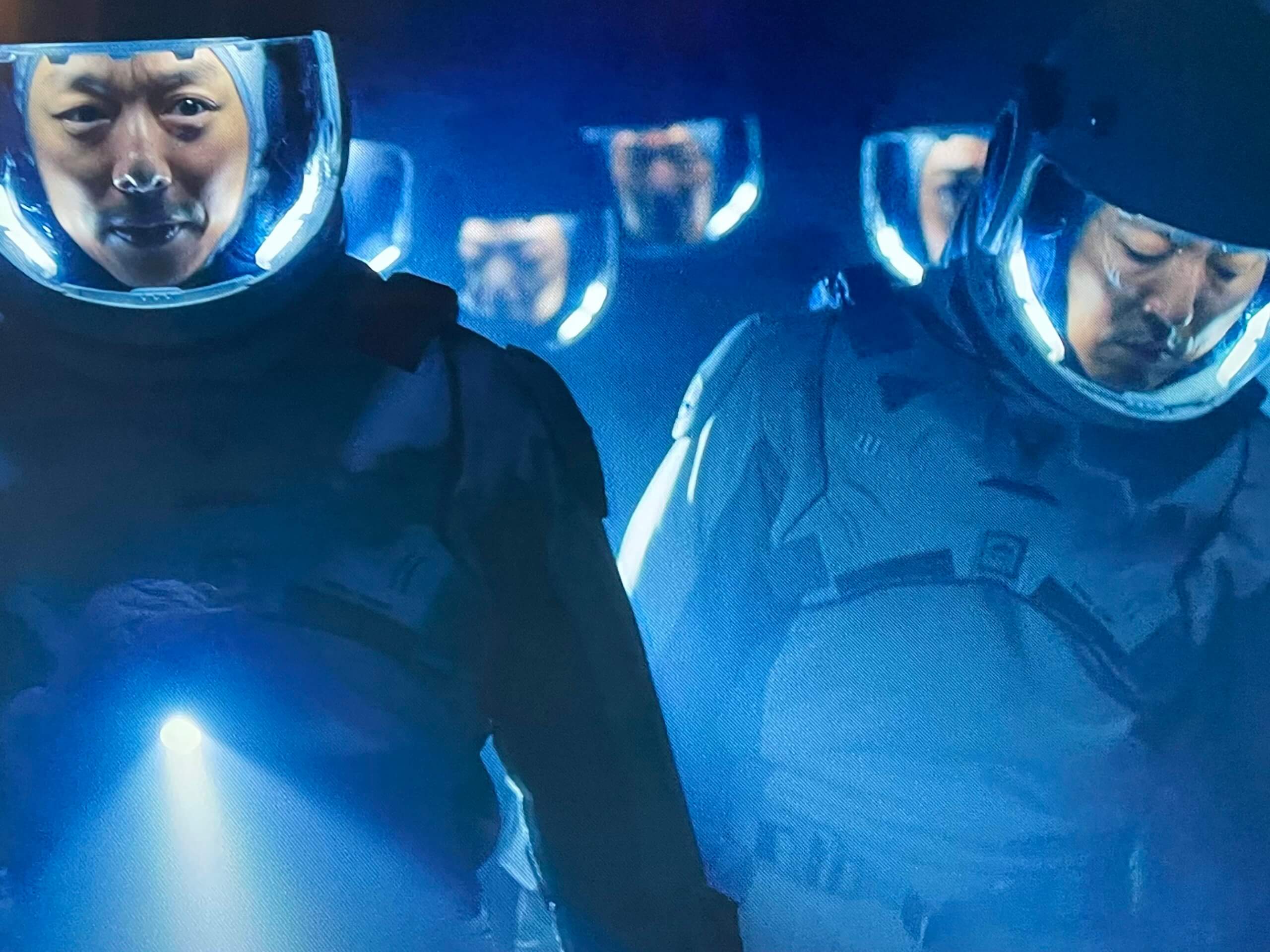
I beat this drum a lot but I do feel that Netflix streaming continues to find the best international productions and when it comes to science fiction, the Korean film/media community is putting out a lot of great product. Produced by Jung Woo-sung, directed by Choi Hang-Yong, who deftly handles the brilliant storytelling of screenwriter, Eun-Kyoi Park. Honestly, I think I could teach a five-hour course on writing with this series, moving scene by scene through the screenplay, in terms of a classic sci-fi thriller. Fun fact, this story (as did Scott’s Alien), closely follows the haunted house template. That means there are a few predictable tropes. The audience knows that the mission is doomed (at least the mission as it was originally conceived) as one by one, the team gets whittled down. Who will remain in the end…that is what the audience wonders. Regarding the various characters, the majority of them hold their own, each having his/her own arc, including the wise-cracking military scrub who just wants to go home…a longing the audience suspects will not be realized.
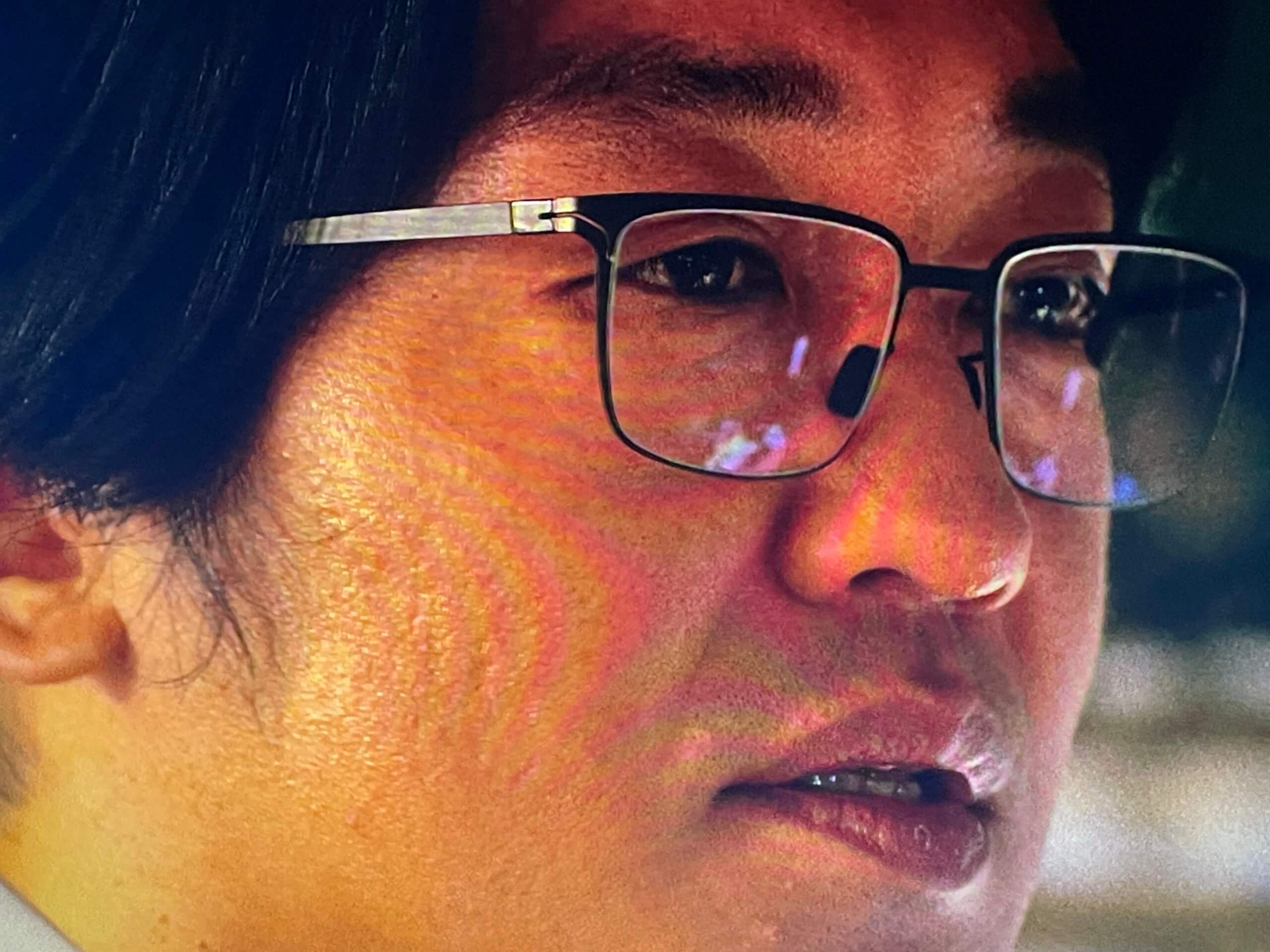
I highly recommend. THE SILENT SEA, and suspect that Netflix now has me pegged in its algorithm as a person who loves Korean-produced thrillers/sci-fi. I might need to give the Koreans their own category on my site. The product is so good, I can’t stop watching and when I watch, I always review.
ALL SYSTEMS RED, by Martha Wells, A No-Spoiler Review of the first novella in the Murderbot Diaries Series

ALL SYSTEMS RED is a story, entertaining and well-written, that one can read in about 4 hours. Rated PG-13 for adult themes. I read this novella on a flight from Minneapolis to Seattle. I flew on Delta and none of the airline’s tv/film options seemed very thrilling to me. I often try to see HBO or Showtime options when on a flight because I don’t subscribe to either of those services in real life. Thank goodness I had taken this book with me, hardback, but thin, lightweight and easy to pack because it’s only 127 pages.
And now, for my Short, No-Spoiler Review
I highly recommend ALL SYSTEMS RED for these 5 reasons.
- Original voice…the narrator has the appeal of an innocent, he/she is like a child, yet holds the capacity to narrate a futuristic society inhabited by humans and AI living and working together
- Genre bending…science fiction merged with mystery…in other words, a page-turner
- Thought-provoking ideas about AI and how future humans might understand morality/humanity in regards to AI
- Interesting world-building and a great set-up for subsequent stories
- ALL SYSTEMS RED would make a great audiobook. See the longer review for more
Longer Review:
Martha Wells has created a fascinating universe of humanity working and living off Earth, in space, in places that can only be reached via light-speed travel. She doesn’t fixate on the physics of the issue (regarding traveling across vast distances) but focuses on the gritty work life of humans and their bots. In the author’s futuristic world, full AI exist as sex workers and security units (SecUnits) and other helps in life. Also, some humans adopt robotic parts (augmented humans). So, there is a mix of how humans have integrated with tech and within the story world, there is little “judgment” about these realities.
While this is all true, the AI mind that narrates this story has a judgment about itself and humans. The view is not completely skewed toward disgust for humans, though there is some leaning in this direction. Granted, I’ve only read the first 1.5 novellas. But what works in the narrative is that Wells has put forward a more dispassionate, yet charming view of the world the way it is. I highly recommend these novellas as entertainment and am slowly discovering how they speak into deeper moral questions around humanity’s race toward the future, a future in which robots and artificial intelligence will be embedded. These books might appeal to the YA reader because the narrator is endearing and “young” feeling. The value in their education would be the discussion around tech and humanity’s future.
Regarding the narrator. The voice is absolutely charming. I did not listen to the book, but can imagine the voice. This book would be a pleasure to listen to.
To buy the first book, click on All Systems Red
Four of the series in hardback can be bought together. Click on Murderbot Diaries
For the least expensive version to try out novella #1, click on Kindle version: All Systems Red
For the audio version of novella #1, click on Audio of All Systems Red
SPACE SWEEPERS, A No Spoiler Review

5 Reason to Watch Space Sweepers, The Short Review
- characters, they’re funny, quirky and smart…They reminded me of many beloved STAR WARS characters
- Special effects, on par with cinematic space opera’s like Star Wars
- Family friendly, nothing offensive for parents trying to figure out what to show their kids
- Excellent space battles
- An ultimate choice for the main character(s) that packs an emotional punch
 The Longer Review
The Longer Review
This film assumes a space opera vibe and so reminded me of Star Wars, yet felt original. The pacing of this screenplay gave exactly the right amount of info while embedding a few nuggets that made me go back a rewatch portions. That was rewarding and I loved the heartbeat of the story’s core…the transformation of a rogue…think of Han Solo and his journey.
Not that this story only bleeds a happy ending. There is a tragic trade that takes place, a brutal choice for the main character. However, the overall adventure ranked above my expectations. When I’m streaming something online like this, I’m not expecting brilliance, but when it’s Korean made, I am coming to expect top-notch production. The Korean film industry is doing something right by focusing on great storytelling and upping the game at every turn when it comes to investing in the visual feast. SPACE SWEEPERS is no exception.

I will continue to seek out, watch and review Korean-produced scifi/horror/speculative fiction because in the last 2 years or more, the flow of great content is undeniable. For more Korean-productions that I’ve reviewed, see:
KINGDOM, A Review of a Korean-Made Masterpiece
SQUID GAME, A Review without Spoilers
TRAIN TO BUSAN, A No Spoiler Review
DUNE Part 1, The film. A No-Spoiler Review

In a similar way that Peter Jackson pleased both the non-reading audience and the hyper fan of the LOTR books, it looks like Villeneuve will do the same for the his audience and fans of the novel, DUNE.
DUNE, the film, is the first of two. It’s only about half of the novel (yet another reason to entice your teen to read the novel), and there could be more films if Villeneuve decides to continue with the novel’s sequels. We’ll see how that goes. The later books are brilliant but probably more challenging for the average audience member to consume. Herbert’s world is a complex and mostly unhappy place on almost all counts.
First, The Short Review of DUNE
5 Reasons to See this Film, Especially if you are a Scifi Fan…
- Mostly pitch perfect and accurate (close to the novel) storytelling
- Herbert’s DUNE is a foundational work in the scifi genre and has a huge international following. Without DUNE, Star Wars might never have been made.
- A vision within the story that transcends culture and era
- Great casting
- An epic visual feast
Now, for the Longer Review…
If you want to go deep, super deep on DUNE, there are papers written, blog posts and articles that speak to why the story DUNE is one that has reverberated in many cultures, especially subjugated cultures, since it was released in 1965. This article is a good one, in case you want more breadth about the history. Click on the link for the Guardian’s penetrating reflection. DUNE article, Guardian.

True, the viewer is only getting a third of the character depth in the film version and for that reason, I encourage all to read (or re-read) the novel. It ages well. But, even if you don’t read the novel, Paul, Leto, Jessica, Duncan, Kynes and the Fremen come across very close to the novelist’s vision. I had two observations of change that caught my attention: Villeneuve did not portray the Atreides’ mostly male in-house staff accurately in terms of their suspicion of Jessica as the betrayer. Their suspicion of the one woman in the mix comes through in the novel, not in the film. Also, the gay Baron Harkonnen is a known child predator in the novel. I can guess there are many reasons Villeneuve decided to forgo this portrayal of the only gay character in the story world. Let him be obese and disgusting in the visuals, but diminish his child predator persona. That seems like a wise decision on many fronts.
The portrayals I loved:
Arakkis, the worms, the Fremen, the sitch, the general feeling of the Bene Gesserit, the Harkonnens, the Sardaukar, the ornithopters, Arrakeen, the costumes (including the stillsuit)…these are all perfect, as are the actors’ portrayals of their characters.
Overall, DUNE was worth the time and money. I highly recommend this film.
FOUNDATION, A No Spoiler Reveiw of the first 2 Episodes

Why unthinkable? The Foundation Series, which began as a few short stories, but over the course of Asimov’s life, evolved into something much more vast, portraying the slow downward spiral of an empire in a sprawling universe over many centuries.
Apple, having bought the rights to the Foundation Series in 2019, invested a large sum to make this happen. The story is definitely being tweaked by Goyer and Friedman, but I am appreciating the adjustments because the Foundation Series novels did not appeal to me. Too many supposedly smart dudes sitting in rooms and talking at one another. Too many ideas delivered in a way that felt preachy to me, therefore dull. Characters that felt interchangeable and almost zero females.
But how about the series? So far I am loving what is evolving on screen. If you’re a scifi fan, here’s why I think it’s worth watching.
- The core of Asimov’s ideas are all there, the story well told so far
- The production design, the sets and costumes are fabulous
- The acting has been surprisingly good
- The screenwriters have changed some of the male characters to female, including Gaal Dornick, the lead character in these first 2 episodes. Dornick, pictured below, is played by Spanish actor, Lou Llobell.

For educators, the idea of eternal rule (by cloning) raises interesting ethical questions, like: How will science and technology impact the governing of humanity?
The third episode drops this Friday, October 1st.
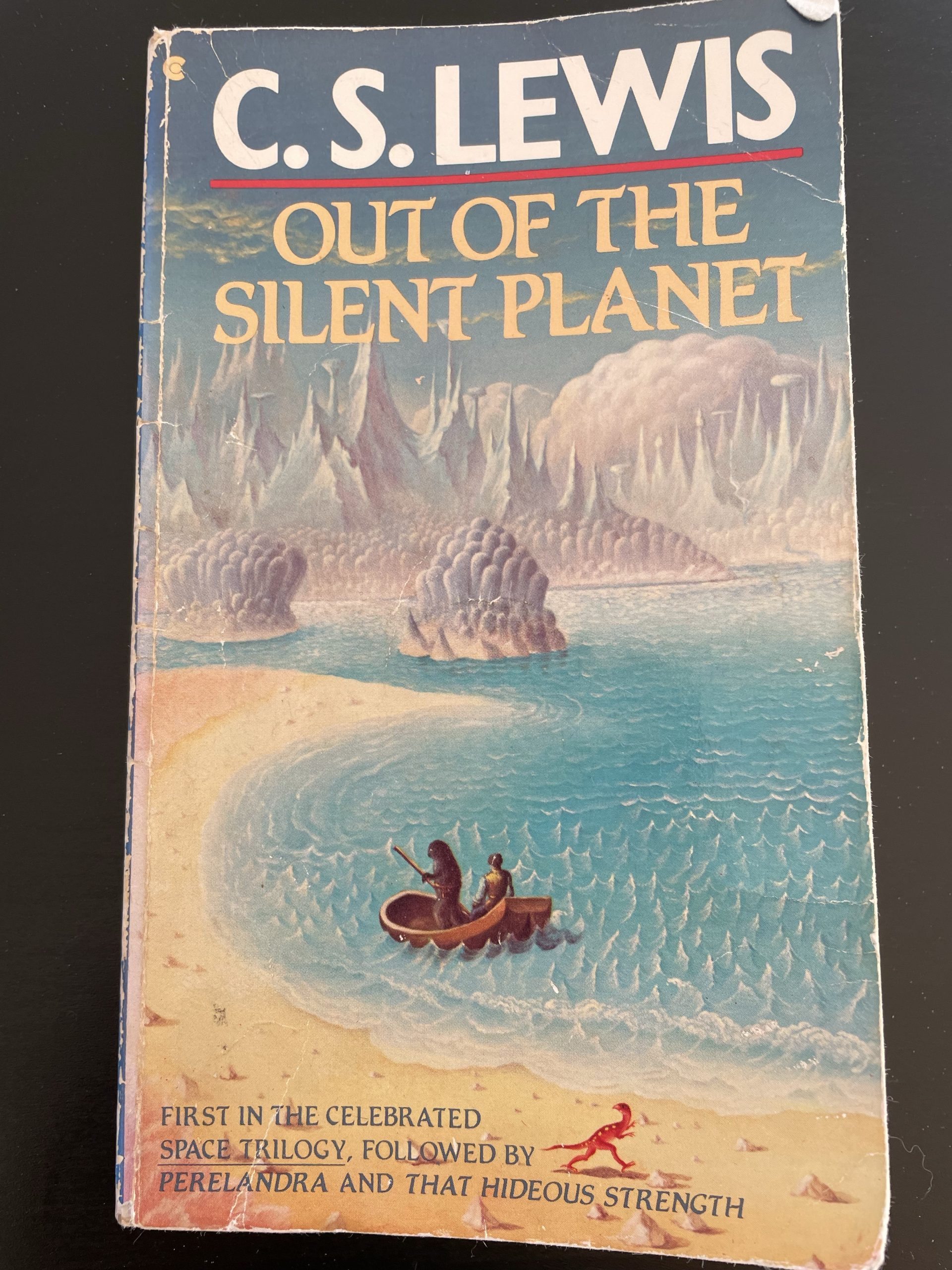

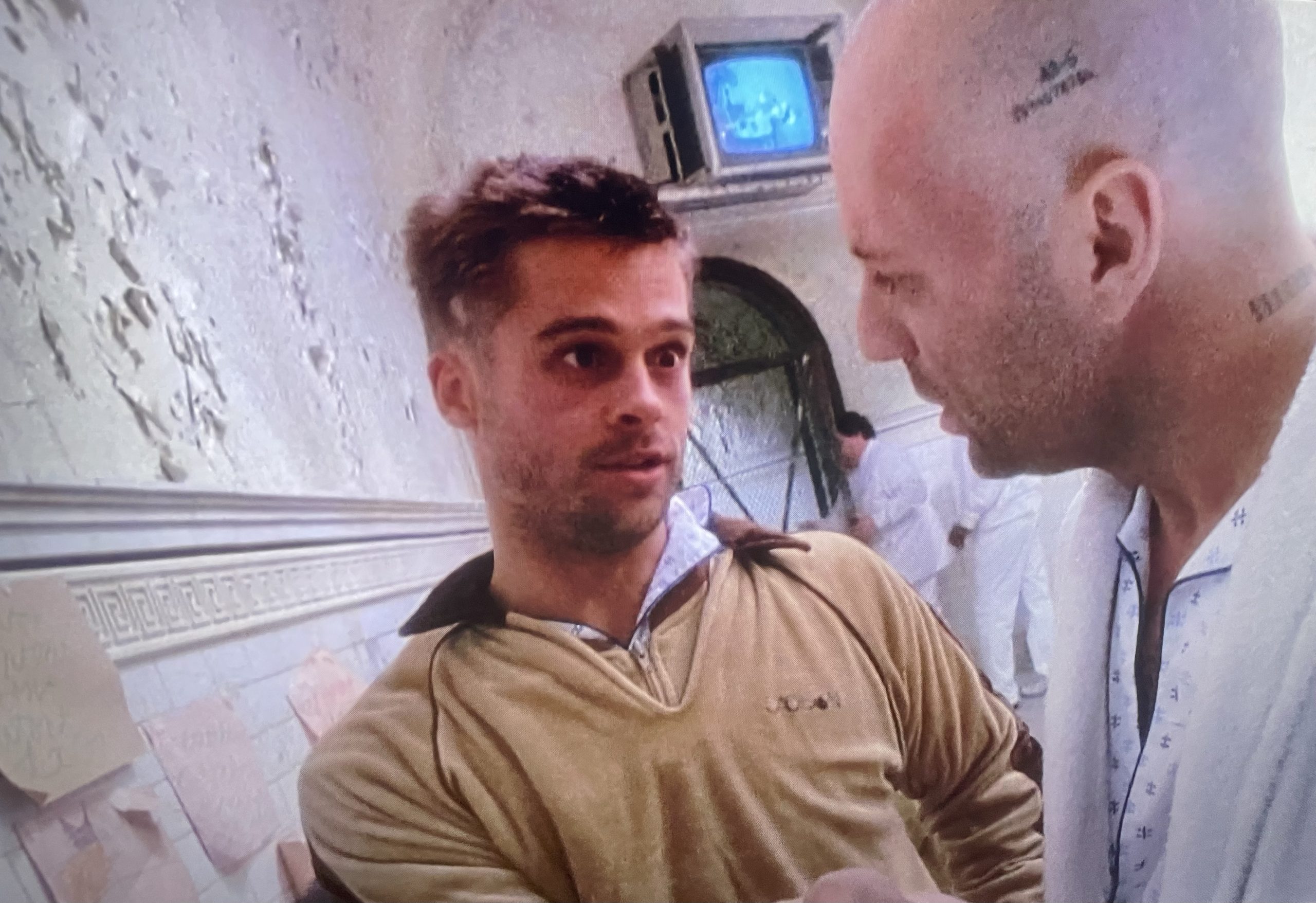





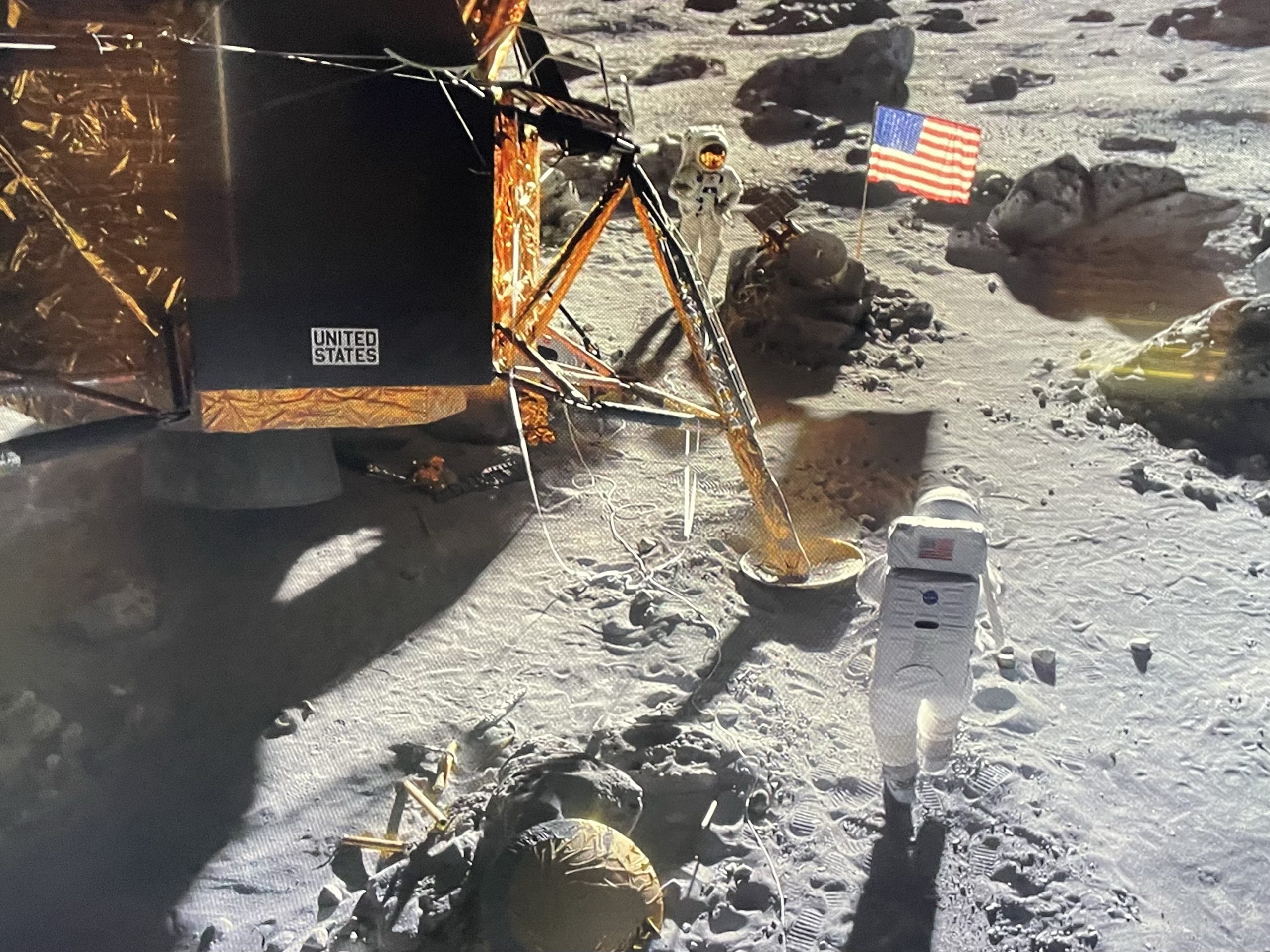

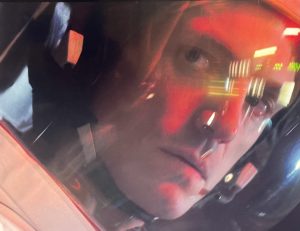

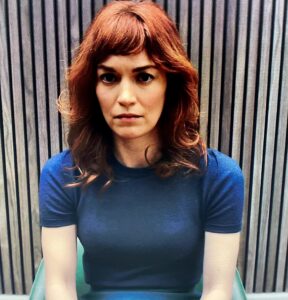

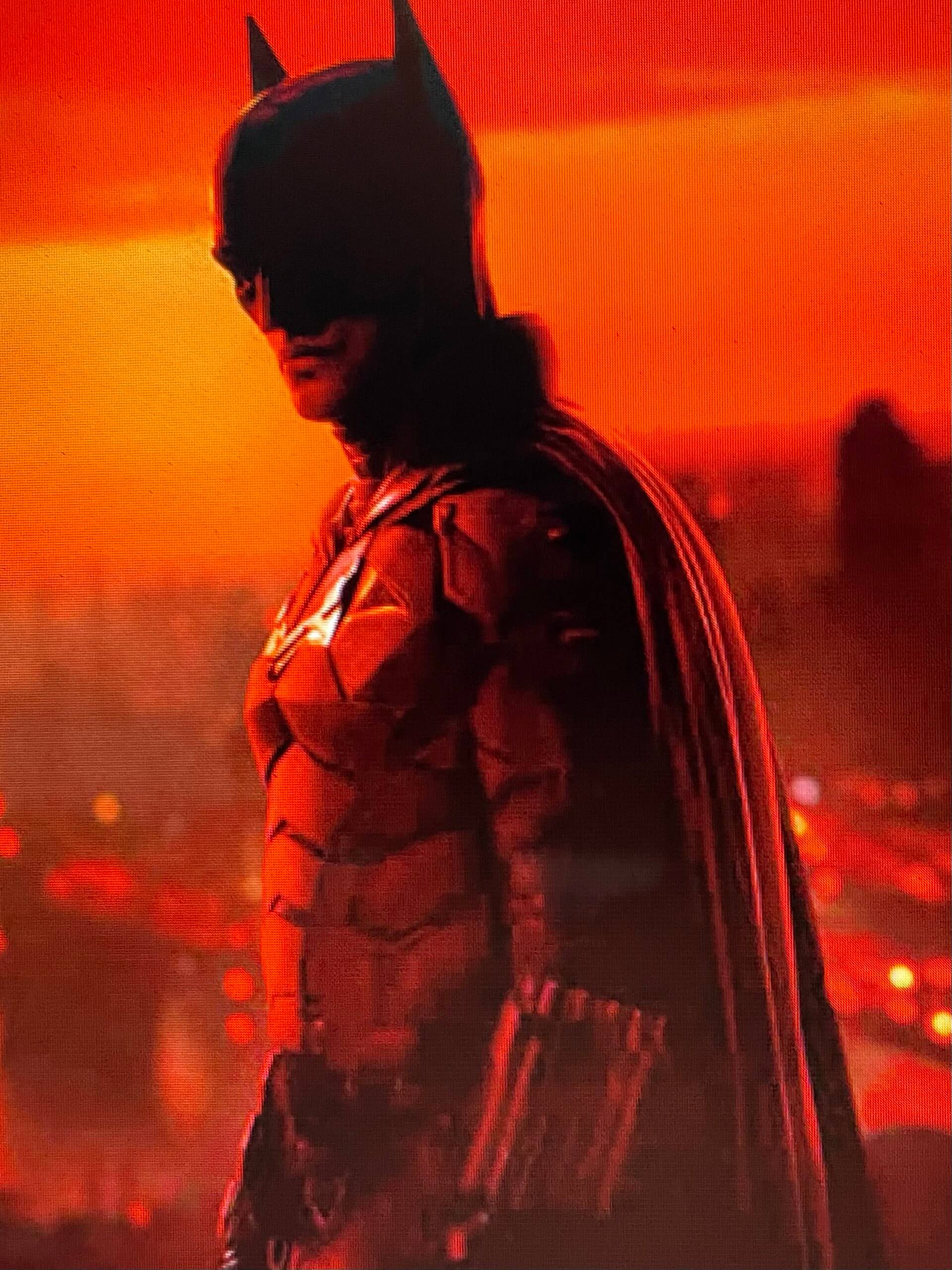


 The Longer Review
The Longer Review

